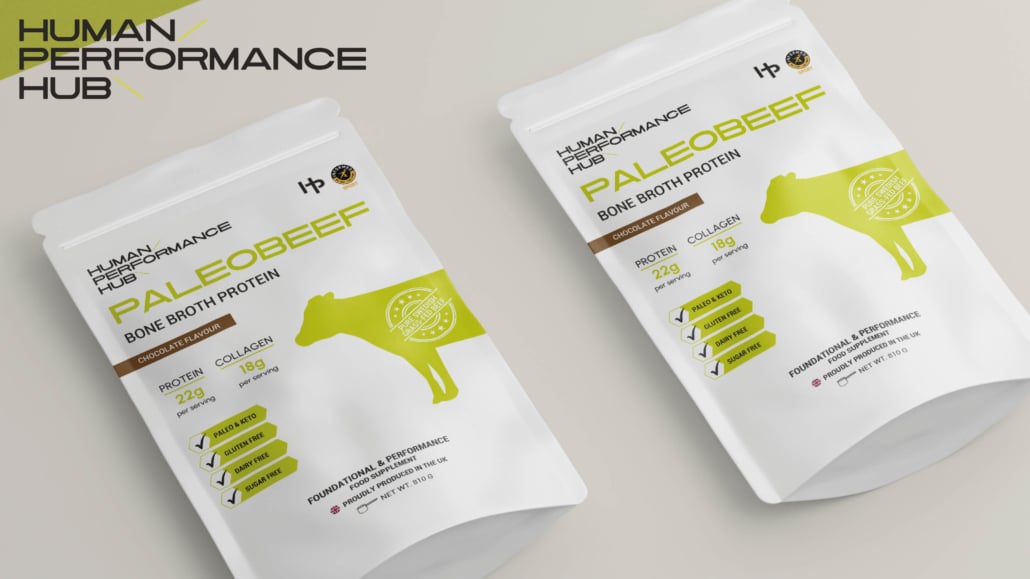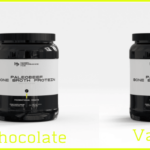Bone broth protein is slowly becoming an internet ‘must-have’ when it comes to fitness and building muscle. It is not a popular supplement amongst many health and fitness enthusiasts alike. It is known for its ability to boost your immune system, improve joint health, and have benefits for your skin and digestion.
But, does bone broth protein build muscle mass?
In this article, we will discuss:
What Is Bone Broth Protein?
Bone broth protein is a nutritional supplement that is made by roasting beef or chicken bones, ligaments, and tendons, and then dehydrated at a low temperature and concentrated into a powder. The protein element of the powder comes from the bone broth and is not added through alternative sources such as whey, soy, or egg.
How Protein Supports Muscle Growth
Protein supports muscle growth by providing the required amino acids to the body. Amino acids are vital in repairing and rebuilding muscle tissue that is broken down during exercise. By consuming protein post-workout, you can provide the body with the essentials it needs to create new proteins in your body. This process is called muscle protein synthesis (MPS) and requires a balance where more protein is built than broken down to result in an increased muscle mass and strength.
In short, protein supports muscle growth by:
- Providing amino acids, which help create new protein in your body.
- Repairs and rebuilds muscle through MPS to build new, stronger muscle tissue.
- Stimulate muscle protein synthesis (MPS), which is essential for building and repairing muscles.
- Creates a positive protein balance by allowing your body to build more protein than what is broken down. This is called a net positive protein balance.
Take a look at our article “Does Bone Broth Protein Powder Have All Amino Acids?” to learn more about amino acids and how they help fitness.
The Benefits Of Collagen For Strength
Collagen is a protein known to benefit strength by providing structure to tendons, ligaments, and bones. Through the use of exercise combined with supplementation of collagen, these can be strengthened over time. Collagen provides amino acids that are needed to repair muscle tissue, which supports muscle mass gain and recovery.
Collagen helps build muscle strength by:
- Supporting connective tissue. Collagen is found in tendons, ligaments, and bones. By supplementing collagen, you can increase the amount of connective tissue in the body, which can result in fewer injuries.
- Promoting muscle repair and growth by providing amino acids that are vital for the task.
- Improving recovery. Collagen is a good supplement that can reduce muscle damage, resulting in a faster recovery time.
- Enhancing muscle mass by combining collagen supplements with resistance training.
The Best Way To Use Bone Broth For Fitness
Using bone broth for muscle building can be made simple by consuming it as a pre-workout drink for sustained energy, or a post-workout drink for muscle recovery and repair. Alternatively, you can add it to recipes and use it as a base for meals.
Pre-Workout Drink
If you’re looking for sustained energy and something that is gentle on your gut, create a bone broth protein drink to sip before your workout. You can also add flavours to the powder to make it taste better, or purchase powder that is already flavoured, such as Human Performance Hub’s PureBeef Chocolate Flavoured Protein Powder.
Take a look at our article “Is Bone Broth Good Before A Workout?” to learn more about the benefits and optimal timings.
Post-Workout Drink
If you want to:
- Aid muscle recovery
- Reduce inflammation in muscles and joints
- Hydrate and replenish electrolytes
Then, having your bone broth protein powder as a post-workout drink will be the best option. It will aid muscle recovery by repairing and rebuilding the muscle tissues after your workout, reduce inflammation as it includes collagen and gelatin, and hydrate and replenish electrolytes such as calcium, potassium, and magnesium.
Add To Recipes
If you’d prefer to take the bone broth protein powder as a meal rather than a drink, you can add it to your meal instead. For example, try using the bone broth as a base for soups, stews, or even as a liquid base for cooking rice.
If you do prefer to add the powder to your meals, make sure to grab a flavourless option!
Why Choose HPH Bone Broth Protein
If you’re looking for a great-tasting bone broth protein powder that is also dairy-free, made from grass-fed beef, and yields 22 grams of protein per serving, our PureBeef Bone Broth Protein could be the one for you! What’s more, it’s free from GMOs, hormones, and antibiotics, making it safe for athletes and certified by Informed Sport.
Shop our HPH Bone Broth Powder below to start your clean, healthy fitness journey!














